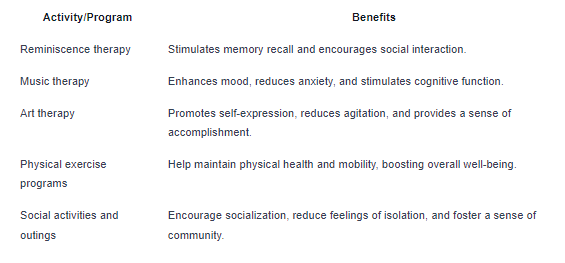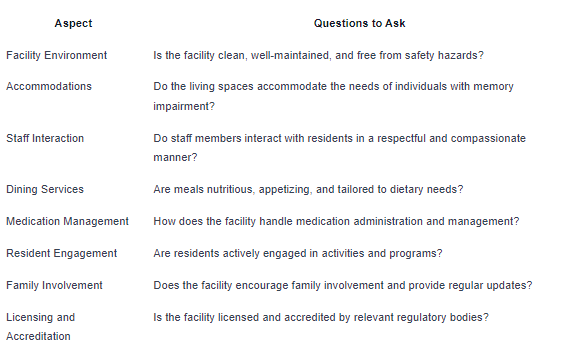What is Memory Care?
March 4, 2025
Discover the importance of memory care! Tailored programs, trained staff, and enhanced quality of life for individuals with memory impairment.


Understanding Memory Care
Memory care is a specialized form of care that caters to individuals with memory impairments, such as dementia or Alzheimer's disease. This type of care is designed to provide a safe and supportive environment for individuals who require assistance with their daily activities and memory-related challenges.
Defining Memory Care
Memory care refers to a comprehensive set of services and support specifically tailored to meet the unique needs of individuals with memory impairments. Memory care communities or facilities are equipped with trained staff and specialized programs to provide personalized care and enhance the quality of life for residents.
Memory care goes beyond traditional assisted living or nursing home care. It focuses on providing a structured environment that promotes cognitive stimulation, safety, and comfort. The goal is to optimize the well-being and independence of individuals with memory impairments while offering support for their families.
Who Can Benefit from Memory Care
Memory care is suitable for individuals who are experiencing memory loss or cognitive decline, particularly those diagnosed with conditions such as Alzheimer's disease or other forms of dementia. Memory care is designed to cater to the unique needs of individuals with memory impairments and provide the specialized care they require.
Memory care can benefit individuals who:
- Experience significant memory loss or cognitive decline
- Have difficulty with activities of daily living, such as bathing, dressing, or eating
- Exhibit behavioral changes, agitation, or wandering
- Require medication management and supervision
- Need a safe and secure environment with 24/7 support
By choosing memory care, individuals with memory impairments can receive the necessary assistance, support, and engagement to live a fulfilling and meaningful life while managing the challenges associated with their condition.
It's important for families and caregivers to explore memory care options to ensure their loved ones receive the specialized care and attention they need. Memory care communities provide a range of services and programs that are designed to enhance the well-being and quality of life for individuals with memory impairments.
Importance of Memory Care
When it comes to individuals with memory impairment, such as those with Alzheimer's disease or dementia, memory care plays a vital role in providing specialized care and support. Let's explore the importance of memory care in more detail.
Specialized Care for Memory Impairment
Memory care facilities are designed to cater specifically to the unique needs of individuals with memory impairment. These facilities are equipped with trained staff members who have expertise in caring for individuals with conditions that affect memory and cognitive function.
Memory care facilities provide a safe and supportive environment where residents can receive the specialized care they require. Staff members are trained to understand the challenges faced by individuals with memory impairment and are skilled in managing behaviors associated with these conditions. They offer assistance with daily activities, medication management, and provide a structured routine that promotes a sense of security and familiarity.
Focus on Individual Needs and Abilities
One of the key aspects of memory care is its focus on individual needs and abilities. Each resident is assessed and evaluated to develop a personalized care plan tailored to their specific requirements. This approach ensures that residents receive the appropriate level of care and support based on their unique circumstances.
Memory care facilities offer activities and programs that are specifically designed to engage and stimulate individuals with memory impairment. These activities may include cognitive exercises, reminiscence therapy, music therapy, and other forms of sensory stimulation. By focusing on the individual's remaining abilities, memory care programs aim to enhance their quality of life and promote cognitive function.
To better understand the importance of memory care, let's take a look at some key components of memory care facilities in the next section.
Components of Memory Care
Memory care is a specialized form of care designed to cater to the unique needs of individuals with memory impairment, such as Alzheimer's disease or dementia. Memory care programs provide a range of components to ensure the safety, well-being, and engagement of residents.
Safe and Secure Environment
One of the key components of memory care is providing a safe and secure environment for individuals with memory impairment. Memory care facilities are designed with features that minimize hazards and promote a sense of security. These may include:
- Secure entrances and exits to prevent wandering.
- Alarm systems and surveillance cameras for continuous monitoring.
- Thoughtfully designed layouts to minimize confusion and promote ease of navigation.
- Safety features such as handrails, grab bars, and non-slip flooring in common areas and bathrooms.
Tailored Activities and Programs
Memory care facilities offer tailored activities and programs to engage residents and support their cognitive, physical, and emotional well-being. These activities are specifically designed to accommodate the abilities and interests of individuals with memory impairment. Examples of tailored activities and programs may include:

Trained Staff and Support Services
In memory care facilities, trained staff members play a crucial role in providing personalized care and support to residents. These staff members receive specialized training to understand the unique needs and challenges associated with memory impairment. They offer assistance with activities of daily living, medication management, and emotional support. Additionally, memory care facilities often have support services available, such as:
- Memory care support groups for families and caregivers.
- Access to healthcare professionals specializing in memory-related conditions.
- Collaboration with external resources and organizations to provide comprehensive care.
By incorporating these components, memory care programs strive to create an environment that promotes the overall well-being and quality of life for individuals with memory impairment. The focus on safety, tailored activities, and trained staff ensures that residents receive the care and support they need to thrive in a compassionate and understanding setting.
Benefits of Memory Care
Memory care plays a crucial role in enhancing the well-being of individuals with memory impairment. By providing specialized care and support, memory care facilities offer a range of benefits that can significantly improve the quality of life for residents and provide peace of mind for their families.
Enhanced Quality of Life
Memory care facilities are designed to create a supportive and nurturing environment that promotes a higher quality of life for individuals with memory impairment. These facilities offer personalized care plans tailored to each resident's unique needs and abilities. This individualized approach helps residents maintain a sense of independence and dignity while receiving the necessary assistance and support.
In memory care, activities and programs are specifically designed to engage residents and stimulate their cognitive, emotional, and physical well-being. These activities may include memory-enhancing exercises, art therapy, music therapy, and social interaction. By participating in these tailored activities, residents experience a sense of purpose, joy, and accomplishment, leading to an overall improvement in their quality of life.
Improved Cognitive Function
Memory care facilities provide a structured and supportive environment that can lead to improved cognitive function in individuals with memory impairment. Through specialized programs and activities, residents are engaged in mental exercises that help stimulate memory recall, problem-solving skills, and overall cognitive abilities.
Research has shown that cognitive stimulation and social interaction have a positive impact on individuals with memory impairment. Memory care facilities offer a range of activities that promote brain health and help slow down the progression of cognitive decline. By engaging in these activities regularly, residents may experience improvements in memory, attention, and overall cognitive function.
Peace of Mind for Families
One of the significant benefits of memory care is the peace of mind it provides for families. Caring for a loved one with memory impairment can be emotionally and physically demanding. Memory care facilities offer professional staff who are trained in dementia care and are equipped to handle the unique challenges associated with memory impairment.
Families can rest assured knowing that their loved ones are in a safe and secure environment with 24/7 supervision and support. Memory care facilities provide assistance with daily activities, medication management, and access to healthcare services. This level of care and support alleviates the burden on families, allowing them to focus on their own well-being and maintaining a healthy relationship with their loved ones.
By choosing memory care, families can have peace of mind knowing that their loved ones are receiving the specialized care they need in a safe and nurturing environment.
Memory care facilities offer a range of benefits that enhance the quality of life for individuals with memory impairment, improve cognitive function, and provide peace of mind for their families. The personalized care, tailored activities, and trained staff in memory care facilities contribute to a supportive and fulfilling environment, promoting the well-being of residents and helping them live their lives to the fullest.
Choosing Memory Care
When it comes to choosing memory care for a loved one with memory impairment, there are several important factors to consider. Memory care facilities vary in their offerings, so it's crucial to evaluate and compare them to find the one that best meets the individual's needs. Here are some key factors to consider when making this important decision.
Factors to Consider
- Location: Choosing a memory care facility that is conveniently located can make it easier for family members to visit regularly. Consider proximity to family, medical facilities, and familiar surroundings.
- Staff-to-Resident Ratio: Adequate staffing is essential for providing personalized care and ensuring the safety and well-being of residents. Inquire about the staff-to-resident ratio and how it aligns with the needs of individuals with memory impairment.
- Specialized Training: Memory care facilities should have staff members who are specifically trained in caring for individuals with memory impairment. Inquire about the training programs and certifications that staff members have completed to ensure they have the necessary expertise.
- Safety Measures: Memory care facilities should prioritize safety to prevent accidents and wandering. Evaluate the facility's safety features, such as secure entrances, surveillance systems, and emergency response protocols.
- Activities and Programs: Engaging activities and programs are crucial for promoting cognitive stimulation and social interaction. Inquire about the range of activities offered, such as memory-enhancing exercises, art therapy, and music programs.
- Personalized Care Plans: Each individual with memory impairment has unique needs and preferences. Look for memory care facilities that develop personalized care plans tailored to each resident's abilities and requirements.
Evaluating Memory Care Facilities
To evaluate memory care facilities effectively, it's essential to gather information and visit the facilities in person. Here are some aspects to consider during the evaluation process:

By carefully considering these factors and evaluating memory care facilities based on specific criteria, families can make an informed decision that ensures their loved ones receive the highest quality of care and support. Remember to take the time to tour the facilities, ask questions, and engage with staff members to gain a better understanding of the services offered and the overall environment.
Sources
https://www.ncoa.org/adviser/local-care/memory-care/
https://www.webmd.com/alzheimers/nursing-home-vs-memory-care
https://www.memorycare.com/what-is-a-memory-care-facility/
Similar articles

Benefits of Group Therapy in Rehabilitation Facilities

How to Develop a Positive Mindset for Rehabilitation Success

How to Build Confidence After Surgery or Injury

How to Manage Post-Traumatic Stress After an Injury

Managing Chronic Illness with Short-Term Rehabilitation

Creating a Daily Recovery Checklist for Patients
Contact us today and experience ”The Name in Healthcare”
Where compassion, well-being, and a welcoming community converge to redefine your healthcare journey. Welcome to Rosewood, where your family becomes our family.














